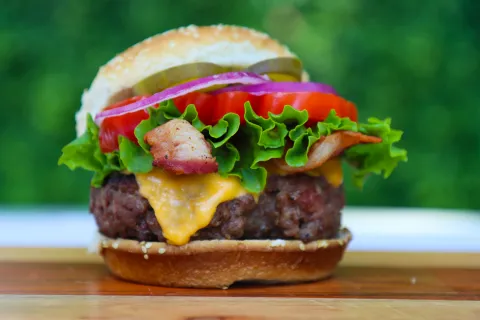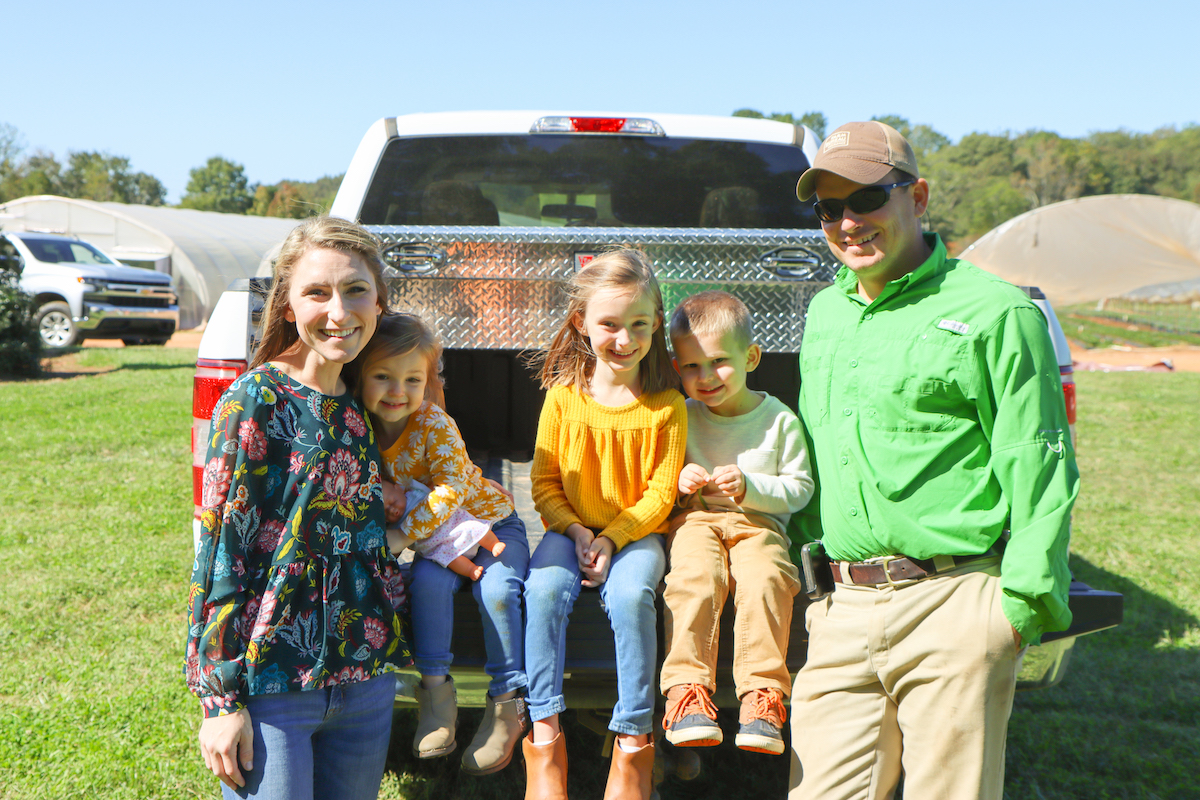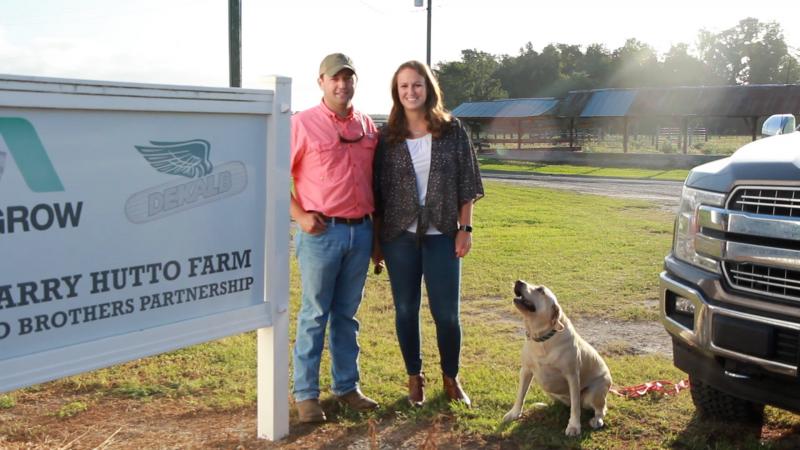
Build a better burger from farms right here in the Palmetto State.
Nothing says summer like a backyard cookout. And the menu? Burgers piled high with your favorite toppings. Meet some South Carolina farmers who grow everything you need to build the perfect burger that will have guests at your next outdoor gathering clamoring for seconds.

BEEF
You can’t have a burger without the beef! Juicy, tasty and grilled just right – it’s really the star of the show.
Clint and Katie Moore raise beef cattle on their farm in Greenville. Clint’s grandfather started Saluda Bend Farm in 1954; Clint’s dad farmed the land after that and now they’re carrying on the legacy. With each generation, the farm has changed. The couple saw an opportunity to meet a need in their local community and started marketing their grain-finished beef directly to consumers about two years ago.
The Moores identified a disconnect between the people who grow food and the ones who eat it, so they decided use their business venture as a way to share their farm story. They also use it as an outlet to explain to people how they care for their animals and the land. Both Clint and Katie work full-time jobs off the farm, so they have long days. Clint’s workday typically begins around 6:30 a.m. and he gets home around 6 in the evening. His work schedule varies somewhat with the season, but he always takes time for church and family on Sundays – after he feeds the cows, of course.
They love the peaceful farm life and say that watching the cattle graze in well-established pasture while the calves frolic in the high grass late in the evening is very relaxing – and in some ways enables them to enjoy their accomplishments on the farm. Clint says he feels honored that God entrusted this land and these animals to them.
Clint’s favorite way to enjoy Saluda Bend beef is a ribeye cooked in a cast iron skillet. As for his perfect burger, it starts with some of their homegrown beef topped with cheese, fried onions and bacon.

CHEESE
Whether you opt to crown it with cheddar, switch it up with Swiss, go all out with Gouda or adorn it with classic American, cheese is an essential topper to a delicious burger.
Glen and Marilyn Easter, along with their cousins Frank and Ernie Easter, of Eastglen Farms in Laurens raise Jersey cows on their dairy. Glen’s family has been raising and milking cows since 1927, and the Easters made the move to South Carolina in 1978 – bringing all their cows with them from Vermont. Some of their animals still maintain genetics from the original herd established nearly 100 years ago.
The Jersey reigns supreme at Eastglen because it produces milk with the most protein, butterfat and minerals – the keys to milk’s rich flavor. The extra solids are great for making cheese, and the butterfat for making butter and ice cream.
A typical day at Eastglen starts bright and early at 12:30 a.m. with the first milking. Each of their 300 cows comes into the computerized milking parlor twice a day. The system monitors how many pounds of milk each cow produces each day, along with lots of other information that reflects the cows overall health. Each milking takes about five hours from setup to finish. The milk produced at Eastglen goes to Pet in Spartanburg where it’s sold as fluid milk.
Dairy farming is a partnership between the livestock and farmer. The farmer ensures the cows’ needs are met by providing them with comfortable housing, and plenty of feed and water (the Easters’ cows eat four times a day). They work with a nutritionist to develop a perfectly balanced diet for the hardworking ladies. Marilyn says with all that dairy farmers do for their animals, she hopes to come back as a cow in her next life!
The Easters LOVE dairy products of all kinds, though butter is Glen’s favorite. Everything is better with butter, he maintains. Marilyn drinks a lot of milk, but also loves her share of ice cream. Glen and Marilyn agree that a double dose of cheese makes the perfect burger.

BACON
We all know that bacon REALLY takes a burger to the next level, so that brings us to our next farmer, Mark McLeod.
On A&J farms in Sumter, Mark farms alongside his son and son-in-law. They raise about 32,000 hogs every year. The pigs arrive at the farm between 11 and 12 weeks of age and are raised to a weight of 287 lbs.
Mark has been around hogs his whole life – he’s the third generation in his family to raise them. The hogs at A&J live in 13 climate controlled barns to help keep them clean, safe and comfortable. Similar to poultry houses, the barns are all automated. This technology helps farmers keep their pigs happy and healthy. They even get bowling balls inside their pens to keep them entertained. The hogs are a Landrace/Yorkshire cross, which Mark says results in a long body with high muscling in the retail cuts (hams, shoulders and loin).
Biosecurity is always a concern on a livestock farm. A few years ago, Mark was able to diversify his business and add replacement gilts (female pigs) to the mix. His farm is ideally located away from other farms to help keep the pigs safe and prevent the spread of disease. Now they raise between 25,000 and 29,000 gilts each year that will go on to be part of other farms’ breeding programs.
For Mark, his favorite part of working on the farm is watching the pigs grow and just being around them. He also enjoys working with his employees to make sure they love what they do. And of course, delivering a quality product to consumers is top priority.
Mark says his perfect burger has a really good cheese and his favorite pork product: bacon!

VEGGIES
Now some might argue that a burger is all about the meat, but it never hurts to add some veggies for extra flavor. For the “healthy” additions, we travel to Bush ‘n Vine Farm in York.
Sam and Lindsey Hall grow everything you need to top your perfect burger. Sam and his dad, Bob, run their 150-year old farm and farm stand. They grow all manner of fruits and vegetables, but Sam says cantaloupe is his favorite to eat.
After college, Sam returned to work on the farm full time and the business needed to expand to support another family. He started Bush ‘n Vine’s Community Supported Agriculture program to offer local produce boxes delivered around their area. The boxes are sold online and delivered to customers who pick them up from a designated spot each week. Now in their 12th year of the CSA, they deliver to 18 locations weekly. Lindsey has been an integral part of helping to market the CSA boxes as well as connecting with customers through newsletters and social media.
At Bush ‘n Vine, the Halls have fine-tuned growing tomatoes in a greenhouse. This method allows them to grow tomatoes 365 days a year in a climate-controlled environment that produces bright red, juicy tomatoes that are just right for burgers.
Their full lineup of produce includes: Asparagus, arugula, blueberries, blackberries, bok choy, broccoli, brussels sprouts, cabbage, cantaloupe, cauliflower, cilantro, collards, cucumbers, figs, green beans, kale, kohlrabi, peaches, peas, peppers, pumpkins, raspberries, spinach, squash, strawberries, sweet corn, swiss chard, tomatoes and watermelon.
Sam says he loves the people he works with and watching crops grow. And Lindsey says there’s no place she’d rather raise their children.
When it comes to the perfect burger, Sam loads it up with lettuce, tomato, ketchup, mustard, mayonnaise, cheese and chili.

WHEAT
What are all these delicious ingredients without a perfectly soft, wholesome bun to hold it all together?
Dean and Sara Hutto grow wheat (among other crops) on their farm in Orangeburg. Dean’s family has been farming for more than 230 years and he is the 7tth generation to live and work on the farm. Dean says they’ve been growing wheat for as long as he can remember, and they usually plant 400-600 acres.
Wheat is unique in that it is one of the few commodities suitable for double-cropping. Farmers plant it in the fall after other crops have been harvested, and it is able to grow unaffected by the frost through the winter. It also helps with weed control in the soybeans that follow the wheat. Most of the Huttos’ wheat goes into animal feed, though if they have a particularly high-quality crop, they will sell to Adluh in Columbia where the wheat will be made into flour.
Dean’s favorite product made from wheat? You guessed it: bread – particularly tomato sandwiches. And as for his favorite burger, Dean likes them with mayo, ketchup, mustard, tomato and bacon.
No matter how you top it or dress it – summertime burgers are hard to beat. And here’s to the men and women right here in South Carolina that make our favorite burgers possible.